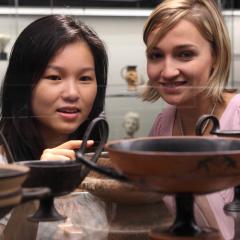Phil Brown, Arts Editor, The Courier-Mail
When the folk at the R.D. Milns Antiquities Museum at the University of Queensland decided to mount an exhibition about ancient citizenship, they must have been having some sort of premonition. I mean, look at what's happened recently around that subject. I'm referring to the dual citizenship matter. Did they have similar problems in ancient times? I'm not sure, but citizenship was certainly an issues - one of pride, generally.
The exhibition Why Citizenship? Stories from Athens and Rome focuses on the important role of citizenship in both modern and ancient societies. This museum is very good at telling these stories. It's a little treasure trove, actually, and if you've never been there, it's in the gracious old Michie Building, upstairs from the UQ Anthropology Museum, and not far from the UQ Art Museum. This little trifecta of museums is well worth a visit, but do check their opening times because only the UQ Art Museum is open on weekends. Entry to them is all free.
The R.D. Milns Antiquities Museum supports and promotes the study of Greek, Roman, Egyptian and Near Eastern civilisations through their material remains. It offers a wide range of programs for primary and secondary schools, university courses and the general public, drawing from its collection of more than 7000 original objects. Having ancient artefacts to hand helps, and for this exhibition, which runs until May next year, there are some fascinating items that act as portals to the past. The Tombstone for Theophile is a marble piece from the Piraeus dating from 400BC to 350BC. There's also a grave marker from Roman Syria that dates to 175-225AD; a military diploma, possibly from Roman Britain (it's bronze), dating from 100-103AD; an altar for Jupiter in sandstone, from Carnuntum, Austria, which dates to from 100-200AD, plus other items.
According to museum director and senior curator, Dr Janette McWilliam, "the exhibition not only uses artefacts to bring to life the stories of citizenship of 10 individuals who lived under Athenian and Roman empires but, through interactive voting panels, it asks visitors to reflect upon universal questions pertaining to citizenship today".
The exhibition was created to help mark the 50th anniversary of the referendum that removed discriminatory references to indigenous Australians from the Australian Constitution and counted them as part of the population for the first time.
Citizenship in the ancient world differed according to the place. In classical Athens, entry into the citizen body was tightly controlled - determined by gender, birth and ancestry - while in Rome, although freeborn status granted a basic set of rights, birth, wealth and gender created a very stratified society.
The exhibition explores the stories of ancient citizens and why citizenship matters, and it invites us to consider and reflect upon concepts of citizenship.
This article was first published in The Courier Mail on 7 October 2017.



